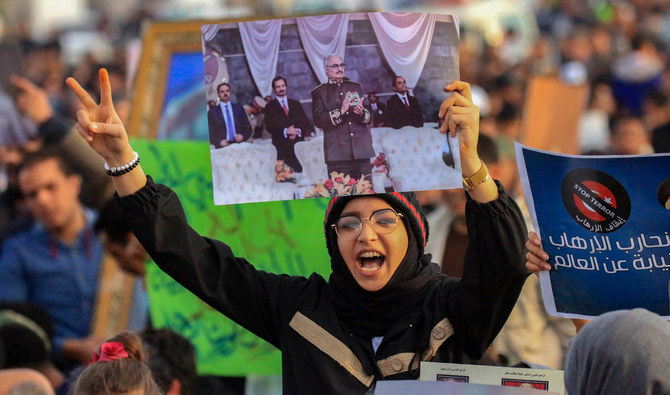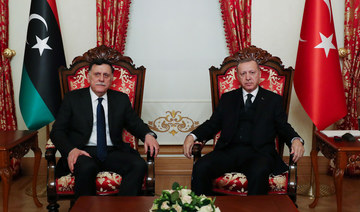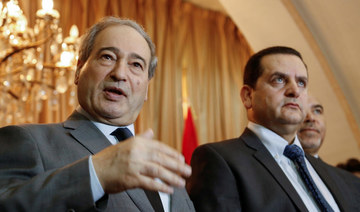ANKARA: Turkish journalists are being arrested for their Libya coverage following President Recep Tayyip Erdogan’s decision to send troops to support the Tripoli-based Government of National Accord (GNA) against military strongman Khalifa Haftar.
Baris Terkoglu, from the anti-government online news site OdaTV, was in detention Thursday in connection with a report about a Turkish intelligence officer who was killed in Libya. Fellow reporter Hulya Kilinc is also behind bars. She is alleged to have uncovered the identity of the agent, even though it was already known to the public.
Terkoglu was charged with illegally obtaining and distributing documents related to intelligence activities and, if convicted, faces up to nine years in prison. He has previously angered the government with articles and books about sects that filled the gap after a crackdown on alleged followers of the US-based Muslim cleric Fethullah Gulen.
Ozgur Ogret, a Turkish representative of the Committee to Protect Journalists, said the arrests were an attempt to stifle criticism of the government’s overseas military operations.
“Turkey is trying to control the narrative of its military actions in Syria and Libya so hard that even the journalists who report about or comment on things that are public knowledge are being prosecuted,” Ozgur told Arab News.
The free flow of information was unstoppable in this age of hyperactive communication, he added, and the only way of controlling the narrative was to intimidate the media in the hope that journalists would self-censor.
The US government-funded Freedom House said Turkey maintained its status in 2019 as the world’s worst jailer of professional journalists.
“Restrictions on basic rights persisted, including repression of those speaking out against the state’s latest military incursion into northern Syria,” its latest report stated.
The announcement of Turkish military casualties in Libya has prompted a mixed response from the public. Erdogan last month revealed several soldiers had been killed there, and he also confirmed the presence of Syrian National Army militants.
“We have several martyrs, but in return we neutralized nearly 100 legionaries,” Erdogan said during a speech on Feb. 22.
More than half of the people interviewed for a survey by an Istanbul-based research institute opposed sending forces to the North African country.
The name of the intelligence officer who died in Libya had been revealed by opposition lawmaker Umit Ozdag from the IYI Party at a news conference before the OdaTV story was published. He was critical of Turkey’s military policy in his briefing.“Ghassan Salame escaped before the boat sank,” said Hamad Al-Bandaq, member of the Tobruk-based House of Representatives, the eastern-based body allied with Haftar. “He failed from the beginning.”
“I consider Salame’s period to be the worst of all envoys,” said Abdul-Qader Hwaili, a member of the High Council, an advisory body to the Tripoli-based government. “Under his watch, Libya witnessed several offensives, the destruction of cities and the current siege on the capital.”
Haftar’s forces attacked the capital last spring, plunging the country into an intensified round of fighting that has killed hundreds of civilians and displaced over 150,000 people.
Salame, an academic and seasoned diplomat who cut his teeth uniting Iraqi factions after the US-led invasion, “was facing a Herculean challenge in Libya,” said Wehrey. His failure to get both sides to solidify even a basic cease-fire points to “broader international disorder” and the weakness of the flouted UN arms embargo.
Libya’s chaos has worsened as foreign backers increasingly intervene, despite their pledges to the contrary at a high-profile peace summit in Berlin earlier this year.
Turkey has sent armored drones, air defenses and more recently Syrian militants with links to extremist groups to prop up the embattled UN-backed Tripoli government.
On the other side, Russia has deployed hundreds of mercenaries to boost Haftar’s assault. The UAE and Egypt also back Haftar with fighter jets, drones and mine-resistant vehicles.
Even over the last few days, rival Libyan factions accused each other of violating a tentative truce with foreign weapons.
The spokesman for Haftar’s forces claimed they shot down six Turkish-made drones and killed 35 Syrian fighters. For its part, a coalition of militias allied with the Tripoli government announced a “sweeping attack” that destroyed six Emirati armored vehicles.
“In the coming hours our combat will be extremely active,” Ahmed Al-Mosmari, the spokesman for Haftar’s Libyan Arab Armed Forces, told reporters late Wednesday.
Salame departed with no hint of who might replace him, or obvious way for the UN’s peacemaking efforts to proceed.
“Without an acceptable political process in place that the parties adhere to, it’s most likely that the conflict will continue in the same way we’ve seen over the last few weeks,” said Claudia Gazzini, a senior analyst for the International Crisis Group.
























